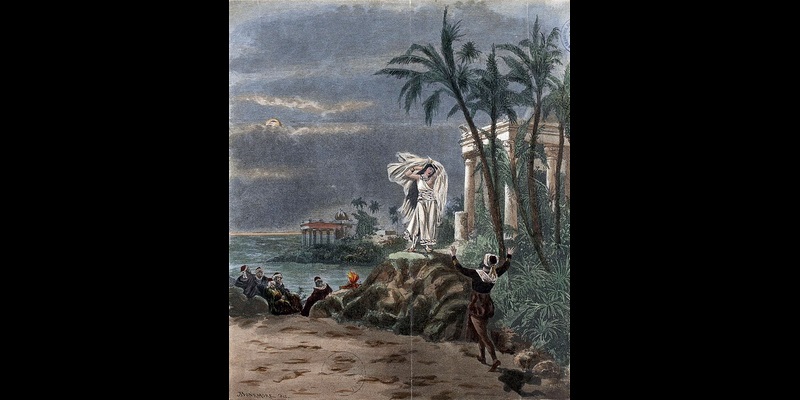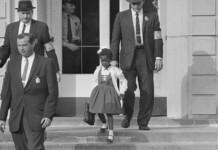161 years ago, George Bizet’s famous opera Les Pêcheurs de Perles, The Pearl Fishermen, debuted at the Théâtre Lyrique in Paris. Set in ancient times on the Island of Sri Lanka, it tells the story of how two men’s vow of eternal friendship is threatened by their love for the same woman, whose own dilemma is the conflict between secular love and her sacred oath as a priestess. The friendship duet “Au fond du temple saint,” generally known as “The Pearl Fishers Duet”, is one of the best-known in Western opera. READ a bit more and listen to the duet… (1863)

The Peral Fishermen was, if one can believe it, composed when Bizet was just 25 years old. The opera was not revived in Bizet’s lifetime, but from 1886 onwards it was performed with some regularity in Europe and North America, and from the mid-20th century has entered the repertory of opera houses worldwide.
Bizet was scrapping and scraping to try and find an opening in the Parisian opera season for any of his one-act works. After getting in only because one of the two state-sponsored opera houses had to occasionally feature operas made by winners of the Prix de Rome, which Bizet had in fact won, he was offered the libretto for The Pearl Fishermen, which he wrote in three acts since he sensed the potential for a real theatric opera piece.
More Good News on this Date:
- Rumi, the beloved Persian poet and Sufi mystic of the thirteenth century was born (1207)
- The American amateur astronomer Henry Draper made the first ever photograph of the Orion Nebula, using his 11-inch Clark Brothers photographic refractor with a 50-minute exposure, becoming a pioneer in the use of astrophotography (1880)
- The author and Nobel Peace Prize winner Elie Wiesel was born (1928–2016)
- League of Nations unanimously outlawed intentionally bombing civilians (1938)
- Mexican-American labor leader César Chávez founded the United Farm Workers (1962)
- Botswana celebrating Independence Day (1966)
- The UK’s first national pop radio station, BBC Radio 1 was launched in the UK to take over from the very successful pirate radio stations, which had been forced off-air by the government—and former pirate DJ Tony Blackburn of Radio Caroline became the first presenter on air (1967)
- Roberto Clemente reached his 3,000th hit, the last of his baseball career, before his death in a plane crash while in route to deliver humanitarian aid to earthquake victims in Nicaragua (1972)
- The first president chosen in free elections by the Serbian people, Vojislav Kostunica, was sworn in after defeating Slobodan Milosevic, Europe’s last dictator, by a wide margin (2000)
- A giant squid in its natural habitat is photographed for the first time 600 miles south of Tokyo (2004)
233 years ago today, Mozart’s opera The Magic Flute (Die Zauberflöte) premiered in Vienna, Austria. The two-act performance set to a German libretto by Emanuel Schikaneder included both singing and spoken dialogue, a popular form at that time.

The opera, conducted by Mozart himself, premiered at Schikaneder’s theatre, the Freihaus-Theater auf der Wieden, just one month before the composer became bedridden and 2 months before he died at age 35 of an unknown illness. It is now considered one of the greatest operas of all time.
In this opera, the mythical Queen of the Night persuades Prince Tamino to rescue her daughter Pamina from captivity under the high priest Sarastro; instead, he learns the high ideals of Sarastro’s community and seeks to join it. Separately, then together, Tamino and Pamina undergo severe trials of initiation, which end in triumph, with the Queen and her cohorts vanquished. The earthy Papageno, who accompanies Tamino on his quest, fails the trials completely but is rewarded anyway with the hand of his ideal female companion, Papagena. WATCH how good overcomes evil in the video, ‘Why Mozart’s Magic Flute is a masterpiece’… (1791)
And, on this day in 1968, the first Boeing 747 aircraft was rolled out of the assembly plant before the world’s press and the 26 airline company officials who had ordered the Jumbo Jet.

The wide-body plane could be used as either a cargo aircraft—with its distinctive upper deck accessible through an optional front cargo door—or as a passenger jet with an upper deck used for a first-class lounge or extra seating. Designed to transport 150 percent more people than the Boeing 707, it held the record for passenger capacity for 37 years. It exceeded critics’ expectations and as of this summer, 1,546 aircraft had been built, with 22 still on order.
95 years ago today, automaker Fritz von Opel flew the first manned rocket plane. The Opel RAK.1 (also known as the RAK.3, as it was his third design) was the world’s first purpose-built rocket-powered aircraft.

Grandson of the Opel company founder, he developed a rocket-powered car and train with the assistance of a pyrotechnics manufacturer and rocketry advocate Max Valier—but their most notable success was the RAK.1, designed and built by Julius Hatry.
Opel singlehandedly piloted the small glider with a wingspan of 36 feet, which was attached to sixteen solid rocket engines, in front of a large crowd at Rebstock airport near Frankfurt, Germany. It flew as fast as 93 mph (150 km/h) for almost a mile (1.5 km) in 75 seconds, before it landed hard, damaging the aircraft beyond repair. Opel planned to build a second rocket plane, but apparently lost interest before the project was completed. WATCH the short filmed flight… (1929)
And, on this day, 64 years ago, The Flintstones premiered on American television. Produced by Hanna-Barbera studio, it follows two couples living next door during the Stone Age—Wilma and Fred Flintstone and their best friends Betty and Barney Rubble. It was the first animated series to hold an evening prime time slot on television, and was designed to capture an adult audience watching alongside kids, like their Tom and Jerry cartoon series did.

The show juxtaposed everyday family concerns of the era, such as raising children and pets, fathers going off to work, and living in a home with modern conveniences (but powered by animals, in this case). An homage to The Honeymooners, it showcased the “modern stone-age family” set in the town of Bedrock.
The Flintstones was the most financially successful and longest-running network animated television series for three decades, until The Simpsons. A little trivia: Mel Blanc, famous for voicing Bugs Bunny and Porky Pig, did the voice of Barney, who often was the victim of Fred’s short temper but always remained a loyal bowling buddy and best friend. WATCH some ‘Yabba Dabba Doo’ highlights… (1960)
118 years ago today, the Royal Galician Academy was established in Galicia, Spain, to provide exceptional instruction of the Galician language in that most Celtic region of Spain. La Real Academia Galega is dedicated to the study of Galician culture as a whole, but especially of the Galician language; it promulgates norms of grammar, spelling, and vocabulary and works to promote the language.

Their work has paid off, as a 2013 survey reported that 51% of the Galician population spoke Galician most often on a day-to-day basis. Grown from Celtic origins into a Medieval romance language, it was kept alive for centuries through poetry, which the academy celebrates. This poem dates to the 13th century, (1906)
What dear delight this summer day,
Its trees and flowers, to me doth bring,
And birds that songs of love here sing,
For joyfully without care
I go, ev’n as all lovers fare,
Who gay and merry are alway.
And when I pass by streams that wind
Beneath fair trees, through meadows fair,
It their love-song the birds say there,
Then all in love I sing straightaway,
And there of love compose my lay
And love-songs make in many a kind.
Great joy and mirth with me abide
When birds sing in sweet summertide.
SHARE the Memories, Milestones, and Music…




















[…] By Good News Network […]